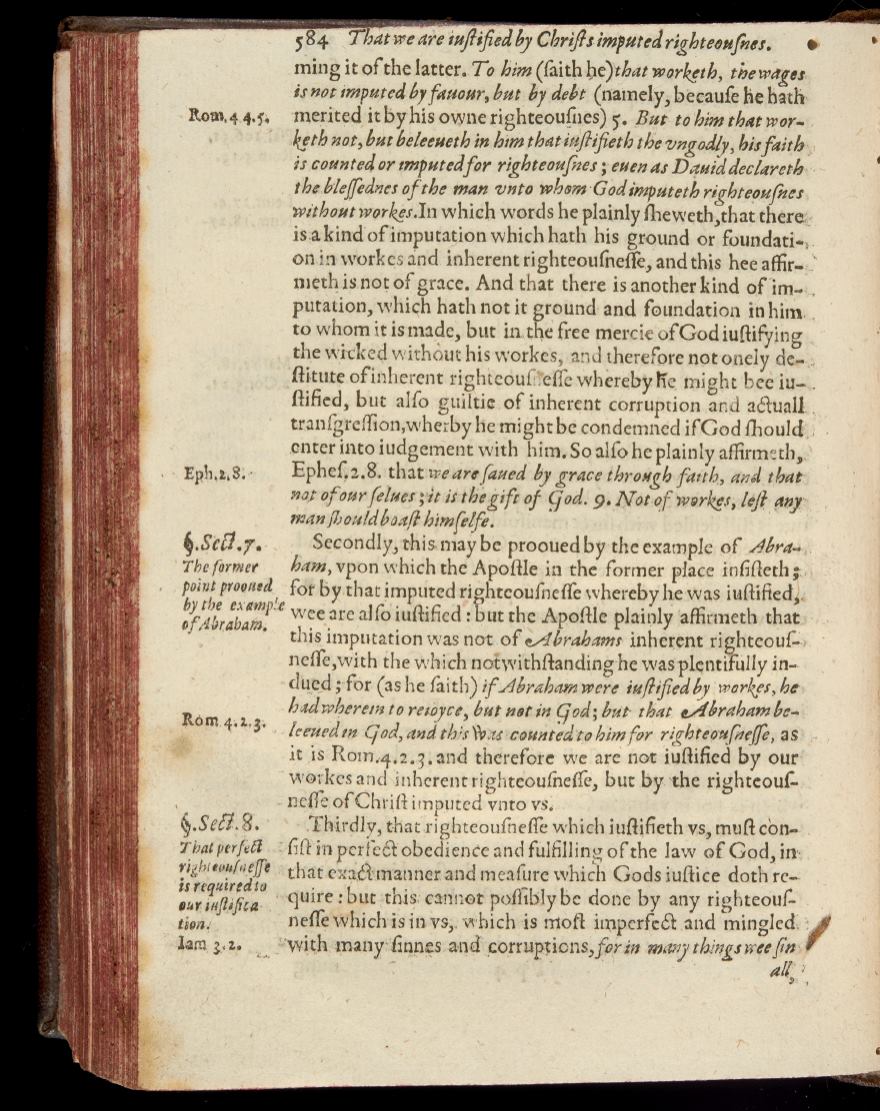

Rom,
4
g.;,
Eph.z,
8.
4.Set7.7.
Theformer
point
proorsed
by
the
ex,rntp.'c
o
f
;.4arabatn.
Ró
tst
4.z.3.
That
perfriF
.
?On
eon/aeft
is
reqairtd
to
ear
irrßiftta
-
tiaaz.
1arn
;<t.
584
That
we
are
iuflified
by
Chriffs imputed righteoufnes.
ming
it
ofthe
latter.
To him
(faith
he)that
worketh,
the
wages
is
not imputed
by
fauour, but
by
debt
(namely,
becaufe he
hash;
merited it by
his ovine
righteouf
nes)
5.
But
to him
that
wor-
keth
not,
but
beleeueth in him
that
iisflifieth
the
vngodiy, his
faith
is
counted or imputed
for
righteoufnes
;
euen
ad
Dauid
declareth
the
bleffedncs
ofthe
man
vnto
wham
Godimputeth righteoufnes
without
workes,In
which words
he plainly
fheweth,that there,
is.a
kind
of
imputation which hath
his
ground
or
foundati-
on
in
workes
and
inherent
righteoufneffe, and
this hee
of iir-
tneth
is
not
of
grace.
And
that
there
is
another kind
of
im-
putation,
which bath
not
it
ground
and foundation
in
him.
.
to
whom
it
is
made,
but
in the
free
mercie
of
God
iullifying
the
wicked
without
his
workes, and therefore
not
onely
de
flitute ofinherent
righteoufeffe
whereby
tie
might
bee
iu-
flified,
but
alto
guiltie
of
inherent corruption and
a6tuall_
.
tranígreffìon,wherbyhe
might
be condemned
ifGod
fhould
enter into iudgetnent with
him,
So
alfo he plainly affirm°th,.
Ephef z.8.
that
Lie
arefaced
by
grace
through
faith,
and
that
n;?t
of
our
feines;
it
is
the
gift
of Cod.
9. Not
of
workes,
left
any.
man
id oteld
6,40
himfelfe.
Secondly,
this,
may
be prooued by the
example
of
Abra-
ham,
vpon which the Apoflle
in
the former
place
inífleth;..
for by
that
imputed
righteouTeffe
whereby
he
was
iuflified,.
wee
are
alto
iuflified
:but
the
Apoflle plainly afñrmeth
that
this
imputation
was
not
of
eflbrahams inherent
ri
hteouf
neffe,with the which
notwithflandinghe
was
plentifully
in-
clued
;
for
(as he
faith) ifAbraharnwere
iu/lifiedby
tvor&es,
he
htd
wherein
to retoyce,
but net
in
Clod;
but
that
eilbraham
be-
/celled
to
ÿ
od,
and
th.
as
*as
counted
to him
for
r:ghteourneff
e,
as
it
is
Rom.4.2.3.
and
therefore
we
are
not
iuflified
by
our
voiles
and
inherent
righteoufnefhe,
but
by
the
righteouf-
neffe
ofChriíl
imputed vnto
vs.
Thirdly, that
righteoufnetfe which iuflifieth
vs,
mull cbn-
fifl
in
peri'ea
obedience
and fulfilling
of
the law
of
God,
in
that
exa
1
manner and meafine which
Gods
iuftice
doth re-
quire
:
but
this;
cannot
poflibly be
done
by
any righteoul'_
nellè
which
is
in.
vs, which
is
mot}
itnperfea
and mingled
4,
with
many
finnes
and corruptions,
forin
many
things
wee
fin
al'

















